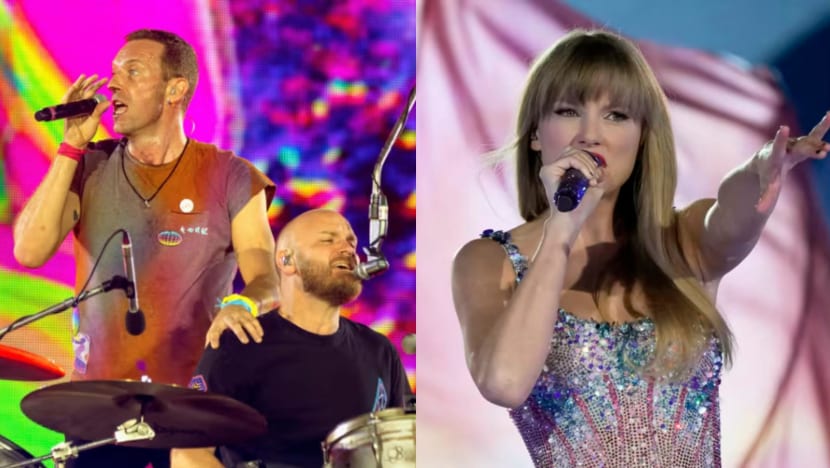Commentary: This is what Taylor Swift could do for Singapore’s stock market
The concert scene in Singapore is booming, with much-anticipated gigs by Taylor Swift and Coldplay next year. OCBC trading strategist Samuel Wong looks at how these concerts will benefit Singapore's tourism, hospitality and entertainment sectors.

Composite photo of Coldplay (PA via AP/Suzan Moore) and Taylor Swift (AP Photo/Ashley Landis).
SINGAPORE: The concert scene is booming right now. Cantopop legend Jacky Cheung - whose concerts went on sale in April this year - just played 11 sold-out shows at the Singapore Indoor Stadium.
And earlier last month, tickets for the Singapore stop of American pop star Taylor Swift’s The Eras Tour - which will be held over six nights at the National Stadium in March next year - sold out in just eight hours.
The demand for Tay Tay tickets reached a fever pitch, with more than 1 million people vying for them in an online queue and lines forming outside SingPost outlets a full 48 hours before general sales commenced. This spectacle mirrored the fervour seen the previous month, when fans scrambled for tickets to British band Coldplay's performances, scheduled for January next year.
In this context, it’s not uncommon for ticket prices, and correspondingly, hotel rates, to reach sky-high prices, fuelling talk of “tourflation”.
GOLD RUSH
Taylor Swift's concerts have proven to be more than just musical events - they have acted as catalysts for economic growth in the regions where she performs.
In the US, Taylor Swift's concerts have led to noticeable economic boosts in the places she performed. In Cincinnati, Ohio, hotels grossed US$2.6 million when she performed during the Jun 30-Jul 1 weekend. In Chicago, Taylor Swift’s three-day stop in early June helped the city set a record for hotel occupancy, the tourism and conventions bureau said, with hotels raking in US$39 million in one weekend.
Her US tour could add US$5 billion to the economy, according to market research firm QuestionPro.
Likewise, for Singapore, Taylor Swift's performances are expected to generate economic activity in the tourism, hospitality and entertainment sectors. With a dedicated fan base across Southeast Asia, Taylor Swift's concerts are expected to attract Swifties from across the region, bringing with them tourist dollars.
According to Traveloka president Caesar Indra, flight bookings during the periods around Coldplay and Taylor Swift’s concerts next year have increased six-fold, indicating the immense popularity of concert-driven tourism. Additionally, hotel reservations at some three- and four-star hotels spiked by more than 20 per cent, according to local reports.
THE STORY OF US
Investors in Singapore’s Straits Times Index (STI) may have something to cheer about, especially given the comparatively subdued performance this year. In the first quarter, the STI grew a modest 0.23 per cent, compared with the US S&P 500 Index, which grew by 7.03 per cent.
First, there is the direct impact on entertainment companies. Shares for UnUsUaL Productions, the concert promoter behind the Jacky Cheung marathon, jumped more than 13 per cent in the days after his concerts were announced.
Another big beneficiary would be stocks that traditionally gain from increased tourism, such as hotels. This has been reflected in the performance of Singapore’s hospitality REITs. Following Jacky Cheung’s concert announcement, CapitaLand Ascott Trust’s stock price rose 4.67 per cent between April and July. A similar pattern was observed for Far East Hospitality Trust’s stock price, which increased 4.88 per cent in the same period.
Their positive performances came despite the high interest rate environment. Higher interest rates tend to decrease the value of properties and increase REIT borrowing costs, meaning downward pressure on S-REITs. However, taking reference from the US Fed fund futures, a rate cut is expected to happen by the Fed meeting in December, which could be beneficial for REITs.
Likewise, the transport sector has similarly trended upward. From April to July this year, the share price of Singapore Airlines increased by 29.38 per cent. While the surge could partially be attributed to post-COVID "revenge travel," concerts have offered an added catalyst for travel. In-country travel stands to benefit as well; notably, ComfortDelGro stocks have gained 5.88 per cent between April and July.
OUR SONG
Beyond the concerts, however, some questions remain: Can this burst of economic activity be sustained beyond the immediate concert buzz? Can Singapore leverage the success of these concerts to solidify its position as a top destination for event-driven tourism?
It’s hard to say. After this initial post-COVID concert rush, the many top-notch world tours that we are seeing now may taper off. The broader category of event tourism, however, has a good chance of sustaining the momentum. World-class venues and strong governmental support have created a unique infrastructure and ecosystem that can support such growth.
Besides the realm of music, sports-related events have also seen good traction. When Liverpool played against Bayern Munich earlier this month, close to 50,000 football fans turned up at the National Stadium. The annual Formula 1 Grand Prix leg in Singapore has also drawn in international crowds since 2008 and generated more than S$1.5 billion (US$1.1 billion) in incremental tourism receipts.
This can only be a good thing for the stock market, particularly those sectors that are tied to tourism such as hospitality and transport. Perhaps 'tis the season more investors start tuning into these Singapore stocks.
Samuel Wong is Trading Strategist at OCBC.




















